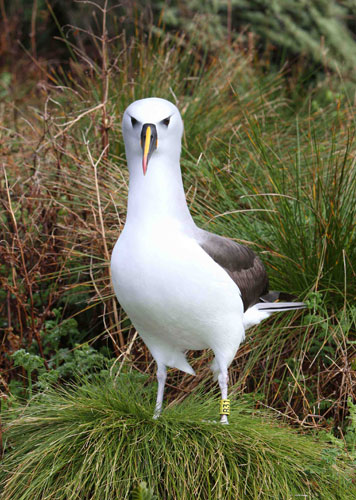In 1982 on my first visit to Gough Island, part of the UK Overseas Territory of St Helena, Ascension and Tristan da Cunha in the South Atlantic, I marked a number of nests of the Atlantic Yellow-nosed Albatross Thalassarche chlororhynchos and banded the incubating birds.
Twenty-seven years later this study colony is still being followed, with all the breeding birds colour-banded and nest sites permanently marked. Surviving chicks are metal-banded every year, and when they recruit as breeders to the study colony (near the South African weather base at Transvaal Bay) they are then colour-banded.
Following my retirement from active marine ornithological research at the end of 2006 the study is now managed by Peter Ryan of the Percy FitzPatrick Institute, University of Cape Town. Given the life expectancy of albatrosses (over 50 years for some individuals) it is crucial that such long-term studies are inherited by a new generation of researchers.
The yellow-nosed albatrosses of Gough are now yielding information that confirms that calling albatrosses monogamous for life is an over-simplification. The occasional laying by two females in one nest, "extra-marital affairs" and males taking up temporary partners for a year ("divorce and remarriage") are all adding spice to the study.

The fortunes of the colony (in terms of breeding numbers and success) over more than 25 years are also revealing trends that may be related to both climate change and anthropogenic mortality from long-line fishing. Teasing out these connections will be the task of the next quarter-century and hopefully a third generation of albatross researchers.
John Cooper, ACAP Information Officer, 2 October 2009

 English
English  Français
Français  Español
Español